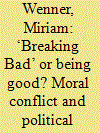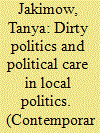|
|
|
Sort Order |
|
|
|
Items / Page
|
|
|
|
|
|
|
| Srl | Item |
| 1 |
ID:
158939


|
|
|
|
|
| Summary/Abstract |
This paper explores the effects of moral pluralism and moral conflict on political conduct and subjectivities. Challenging cultural relativist and monist positions, but going beyond a solely pragmatist reading of South Asian politics, it displays how actors navigate between conflicting roles, domains, commitments, and values. These contradictions, I argue, have a structuring effect on politics. This is not only because attempts to juggle different moral values guide political conduct, but also because moral evaluations of leaders are one constituting element of political legitimacy. I explore these effects through a case study from Darjeeling, India, where a movement for regional autonomy demanding ‘virtuous’ dedication from leaders and followers seems to pose a counterpoint to a perceivably ‘dirty’ party politics. The case shows that there is not one overarching value guiding political conduct, but that different priorities gain or lose importance over time. Far from being passive subjects forced to comply with immoral politicians, some decide to live up to their personally held principles.
|
|
|
|
|
|
|
|
|
|
|
|
|
|
|
|
| 2 |
ID:
190937


|
|
|
|
|
| Summary/Abstract |
Politics is dirty’ is a truism, a taken-for-granted reality in much of the world, particularly in India. Its implications are likewise seen as inescapable. Scholarship examining women’s political underrepresentation often cites the ‘dirty’ nature of democratic politics as a key disincentive for women to participate. While not disputing that politics is, in some respects, ‘dirty’, I question the mechanisms through which it is said to hinder women’s political representation. Drawing upon ethnographic research with female party workers and elected municipal councillors in Dehradun, North India, I analyse how ‘dirty politics’ positions women as ‘out of place’ within the political realm. While both men and women engage in acts of political care, men can more easily transgress the boundaries between them, straddling both ‘dirty politics’ and a ‘politics of care’. This production of the ‘political’ as a realm unsuitable for women or mismatched with their activities, is one factor contributing to the underrepresentation of women in politics in South Asia, and beyond.
|
|
|
|
|
|
|
|
|
|
|
|
|
|
|
|
|
|
|
|
|